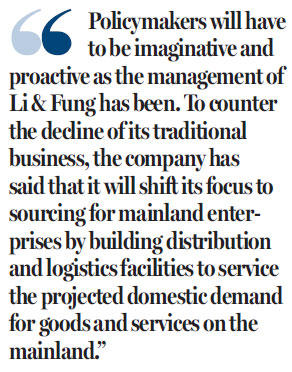Beware the rise of protectionism
Updated: 2016-04-21 07:41
By Peter Liang(HK Edition)
|
|||||||||
Peter Liang warns that HK must re-position its economy for a possible rise in protectionism in Western markets, which could result in a decline in exports
The world's finance ministers' meeting in Washington was held last week against the backdrop of a weakening global economy and rising trade protectionism.
Both these factors are particularly keenly felt in the open economy of Hong Kong and the export-oriented emerging economies of the region - including the Chinese mainland. The pessimism surrounding the Washington meeting was summed up by the comments of the top International Monetary Fund (IMF) officials. "In many countries the lack of wage growth and greater inequality has created a widespread sense that economic growth has mainly been to the benefit of economic elites," said Maurice Obstfeld, economic counselor to the IMF. "Lower growth reinforces this trend toward inward-looking nationalistic attitudes," he added.
If you are wondering who these "many countries" are you do not have to look far. Just listen to the rhetoric of the front-running candidates in the US presidential race. They all have threatened to get tough with their trading partners in renegotiating trade pacts.
Such a swaggering stance has won them wide support among the working class citizens who have become disillusioned with stagnant wages despite the increase in productivity. This development, according to economists, has led to the persistent decline in the living standards of most US workers.
European leaders are too preoccupied by the problem of the euro and the flood of refugees from the Middle East to pay much attention to external trade issues. But the rise of so-called "right-wing" political factions in some member countries is forcing the European Union to examine more closely how much real benefit globalization has brought to people's lives.

Trade protectionism in any form is the nemesis of Hong Kong's free economy, which is built on its role in facilitating the flow of goods and services across borders. For that reason, Hong Kong has benefited greatly from the gathering pace of globalization in the past several decades - serving as, well, the "super-connector", as the government loves to say, between buyers in developed economies in the West and suppliers in the manufacturing bases on the mainland and elsewhere in the region.
But even before protectionism becomes a real threat, more and more buyers and suppliers are bypassing Hong Kong to trade directly with one another. The trend has been made obvious by the decline of the traditional sourcing business of one of Hong Kong's largest trading companies, Li & Fung Ltd.
This development, together with the expected rise in protectionism in Western markets, could lead to a structural, rather than cyclical, decline in exports - a major growth engine which consists largely of shipments to and from the Chinese mainland. Unsurprisingly, Hong Kong has already slipped behind Shenzhen as an external trade hub, based on container throughput.
Some politicians and economists have warned that Hong Kong is losing its relevance in the mainland's economic development. But hardly any of them have put forward concrete suggestions other than putting the blame on growing social and economic discord. The question is, what is there to agree on when nobody has produced a credible and comprehensive blueprint of action that can inspire and win over the public?
To do that, policymakers will have to be imaginative and proactive as the management of Li & Fung has been. To counter the decline of its traditional business, the company has said that it will shift its focus to sourcing for mainland enterprises by building distribution and logistics facilities to service the projected domestic demand for goods and services on the mainland.
It is a daunting task involving the development of new business connections on a global scale. It took many years for Hong Kong to build up its buyers' network in the West. It will have to do it on the mainland and establish connections with Western suppliers in a much shorter time frame.
The window of opportunity is closing fast. Hong Kong must accomplish this highly challenging task while it still enjoys the advantage of a more open economy and higher degree of familiarity with overseas markets than Shenzhen, or Shanghai for that matter.
It is time for political and business leaders to act rather than indulge in the blame game that is doing nobody any good.
The author is a veteran current affairs commentator.
(HK Edition 04/21/2016 page10)